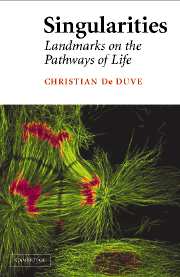Book contents
- Frontmatter
- Contents
- Foreword
- On Christian de Duve: An Editor's Appreciation
- General Introduction
- 1 Building Blocks
- 2 Homochirality
- 3 Protometabolism
- 4 ATP
- 5 Electrons and Protons
- 6 Thioesters
- 7 RNA
- 8 Proteins
- 9 DNA
- 10 Membranes
- 11 Protonmotive Force
- 12 Protometabolism Revisited
- 13 The LUCA
- 14 The First Fork
- 15 Eukaryotes
- 16 Oxygen
- 17 Endosymbionts
- 18 Multicellulars
- 19 Homo
- 20 Evolution
- Final Comments
- Bibliography
- Index
14 - The First Fork
Published online by Cambridge University Press: 18 January 2010
- Frontmatter
- Contents
- Foreword
- On Christian de Duve: An Editor's Appreciation
- General Introduction
- 1 Building Blocks
- 2 Homochirality
- 3 Protometabolism
- 4 ATP
- 5 Electrons and Protons
- 6 Thioesters
- 7 RNA
- 8 Proteins
- 9 DNA
- 10 Membranes
- 11 Protonmotive Force
- 12 Protometabolism Revisited
- 13 The LUCA
- 14 The First Fork
- 15 Eukaryotes
- 16 Oxygen
- 17 Endosymbionts
- 18 Multicellulars
- 19 Homo
- 20 Evolution
- Final Comments
- Bibliography
- Index
Summary
By definition, the LUCA, being the last universal common ancestor, stands at the apex of the first bifurcation in the history of life that had both branches surviving and extending until the present day through an uninterrupted line of descent. By analogy with other evolutionary bifurcations, it may be assumed that this historical first was initiated when some mutant form was allowed by natural selection to develop into a new line, most likely adapted to a different environment, while the original line went on unchanged. Thus, one branch of the postulated bifurcation was new, whereas the other continued the LUCA, forming what is known as the root of the tree of life.
Until the development of modern molecular methodologies, these events remained shrouded in the darkness of the distant past. Our ignorance, in fact, covered the major part of the history of life, when only microbes existed and spread their networks over the entire Earth, leaving hardly any trace of their passage. For most observers, the deepest cleft was that between prokaryotes and eukaryotes (from the Greek karyon, nucleus). Prokaryotes, commonly called bacteria until recently, are single cells of small size, with little internal structure and no defined nucleus. Eukaryotes, which may be unicellular (protists) or multicellular (plants, fungi, and animals), consist of much larger cells with a highly structured interior (cytoplasm) and a distinct, fenced-off nucleus.
- Type
- Chapter
- Information
- SingularitiesLandmarks on the Pathways of Life, pp. 170 - 185Publisher: Cambridge University PressPrint publication year: 2005



